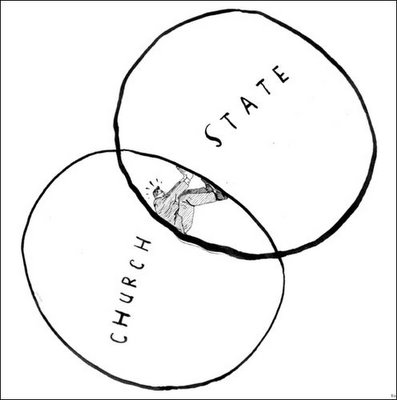
W hat should be the relationship between faith and politics at the ballot box?
This afternoon I attended a public forum on the role of faith in politics held in Columbus. The forum was co-sponsored by Americans United for the Separation of Church and State (AU) and the American Center for Law and Justice (ACLJ). There was a moderator of the discussion and a total of six panel members.
Representing the Christian right-conservative viewpoint were Jay Sekulow of the ACLJ, Rev. Russell Johnson, Pastor of the Fairfield Christian Church and Phil Burgess, Executive Director of Citizens for Community Values. Representing the Christian left-secular-liberal view were Rev. Barry Lynn, Executive Director, AU, Rev. Eric Williams, a lead spokesman for the 56 central Ohio religious leaders who recently sent letters to the IRS complaining of partisan political activities by to Central Ohio churches, and Marcus Owens, counsel for All Saints Episcopal Church of Pasadena, California who was instrumental in formulating a recent complaint to the IRS concerning questionable partisan political activities by two central Ohio churches. Pastor Johnson was one of the churches against which the complaint was filed by Williams and Owens.
The back and forth presentations and interchanges where very civil. The basic position of the Christian left-secular-liberal panel members was that since the beginning of our country their was a secular constitution and laws and that church has no place in matters of state. The churches may speak to issues of morality and concern to the community in their buildings, but they should never blatantly endorse any candidate. This is the only stipulation for the privilege of tax exempt status. Barry Lynn's AU is one of the watchdog groups who try to insure and point out when churches or church leaders cross the line.
The Christian right-conservative panel members contended that much of America's constitution and laws were based on Judeo-Christian principles. Jay Sekulow pointed out that the Christian left-secular-liberals have been politically active for forty years or so, and that it has been just recently that the Christian right-conservatives have been asserting themselves. There seems to be a double standard of sort, when Rev. Jesse Jackson can use the pulpit in black or liberal churches to make political speeches, but someone like Pastor Johnson has a complaint filed against him for apparently crossing the line in his church-related political activities.
I guess what precipitated much of this debate was the fact that faith is somewhat of an issue in the Ohio Governor's race. Ken Blackwell is not inhibited in sharing strong positions on the issues based on his faith. While Ted Strickland points out that he is an ordained minister and is a person of faith as well, though maybe of a different persuasion. The governor's race may to a great extent be a reflection of the discussion that went on this afternoon at the Riffe Center in downtown Columbus. It boils down to does Ohio want a totally Christian-leftist- secular-liberal Governor or do we want a Christian-right-conservative for Governor. This is a clash of world views. One that wants God put in His place, the church. The other wants to bring a belief in God to the day to day affairs of politics, government and society.



No comments:
Post a Comment